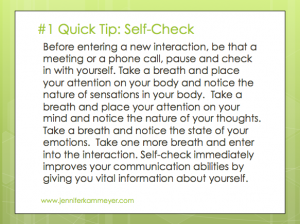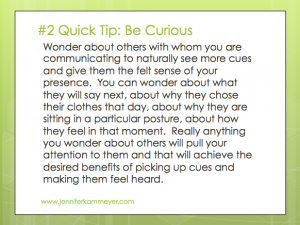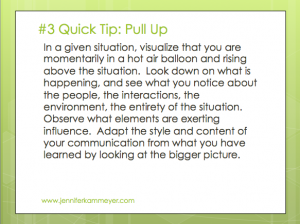Managing Our Attention Improves Communication: Simple (Not Easy) Techniques for Better Focus
In today’s highly stimulating world where we often spend the day fending off overflowing email inboxes and incessant smartphone notifications, the ability to focus is a critical skill. Good management of our own attention is particularly important for effective leadership communication. Research shows the value of our attention, especially for leaders, and yet, we often let our attention get pulled instead of deliberately managing it. My contribution to this topic is to offer a few simple quick-tip techniques for improving our attention abilities, and subsequently our communication.
Daniel Goleman, in his book Focus, outlines the attention triad: focus inward, focus on others, focus outward. In communication, the focus inward gives us insight into what is personally influencing our own communication in the moment. Focus on others allows us to pick up and respond to their cues. Focus outward allows us to frame the communication within a bigger context. Let’s look at each of these areas in a bit more detail, through the lens of leadership communication.
The first focus is inward attention. We all walk into every communication situation with baggage. That baggage can be old and deeply instilled – such as cultural values and biases based on our experience – or current and transient – such as our emotional reaction to something that just recently happened. Knowing what we carry into a communication situation allows us much more control over how we communicate. Intentionally placing our attention inward reveals that knowledge. Good leaders communicate more effectively because they are aware of themselves and deliberately choose how they let tendencies and current states influence their interactions with others.
The second focus of the attention triad is focus on others. It is entirely possible to spend time with somebody and not actually give them our attention. We see this trend in meetings where people’s bodies are in the room, but their eyes and minds are connected to their electronic devices and not the others in the room. As soon as you enter into an interaction, it is beneficial for your attention to shift to others.
“The person in front of you does not know what your dealing with a moment ago, and there’s no reason he or she should. It’s your responsibility to show up and be fully present to effectively utilize the limited time you have with each person you are with.” Hougaard and Carter, The Mind of the Leader.
Paying close attention to others gives us two advantages: seeing things we might otherwise miss, and making others feel our presence. When paying close attention, we pick up many more nonverbal communication cues, such as a shift in a chair or a side glance to a colleague. If our attention is elsewhere at that moment, like on an electronic device, we miss those subtle moments. These hidden cues can be extremely helpful in our understanding of the situation, and our ability to adapt our communication accordingly. The other advantage is that people feel heard when our attention is directed at them. When our attention is focused on other people, they feel our presence. This is powerful because felt presence builds confidence and motivates others to do their best. People perceive they are valued and are better versions of themselves when they feel heard, and our attention on them achieves that.
After attention focused inward and attention focused on others, the third piece of the triad is focus outward. Focus outward is placing our attention on the bigger context, such as what has been on that news that day and any events or circumstances that are impacting
the people with whom we are communicating. With busy schedules and information overload it is easy to get myopic, focused on what is immediately in front of us in order to get anything done. To broaden our minds, we need to pull up for a higher perspective, observing the entirety of a meeting, our company, our market, or even our world. This bigger picture gives us information to be contextually sensitive and adaptive in our communication.
Our communication improves when our attention is grounded in the present moment and on the person(s) involved in the interaction. It sounds simple, but it is not easy. The three quick tips of doing a self check, being curious, and pulling up are ways to practice deliberately managing our attention to advance our communication skills.
Jennifer Kammeyer combines over 25 years of industry experience with academic research to advise leaders on how to intentionally use communication to elevate professional relationships and improve business outcomes. She offers coaching one-on-one, in teams, and through workshops. As adjunct faculty at San Francisco State University, she is up to date on new communication research and trends, allowing her to advise professionals on a wide range of communication topics. Popular training topics include building executive presence, leadership communication, public speaking, high-value meetings, and mindful communication. She has been personally practicing mindfulness since 1999 and incorporates those concepts and techniques into all of her teaching.


